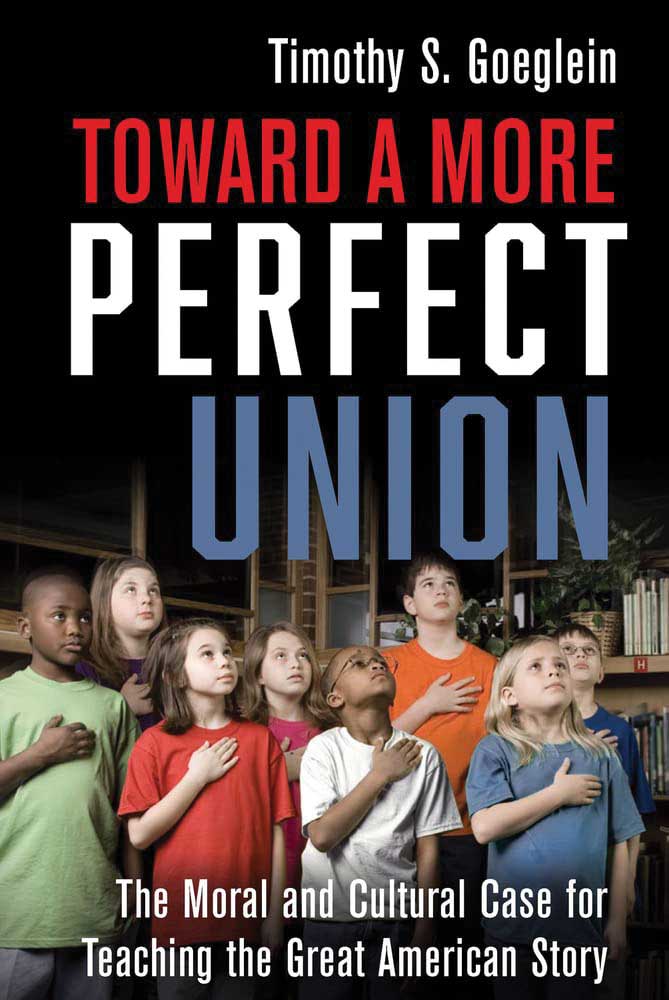A Review of "Toward a More Perfect Union: The Moral and Cultural Case for Teaching the Great American Story" by Timothy S. Goeglein
Until the 1970s, U.S. schoolchildren learned about the founding of America as a beacon of liberty and refuge for the world’s oppressed who were yearning to breathe free. Now, from kindergarten through college, students are fed a grossly skewed narrative that frames America as the oppressor. In his book Toward a More Perfect Union: The Moral and Cultural Case for Teaching the Great American Story, Timothy Goeglein traces this 180-degree turn to shifts in the teaching of U.S. history. Even so, in hopeful defiance of the prophets of American demise, he points us to some potent, readily available resources for meeting the trend and countering it head-on.

Falsified History
First, some background. Much of the distorted history can be traced to the works of Howard Zinn, whom Goeglein describes as “the godfather of the radical attack on America’s history and heritage.” Either a card-carrying member or fellow traveler with the Communist Party (historians differ on that minor point), Zinn systematically recast American history through the lens of his own, red-colored glasses, and the pernicious disinformation has now sullied at least two generations’ understanding of their own heritage.
Taking Zinn’s condemn-America-first project to the next level is the “1619 Project,” which does not even pretend to be history. According to its biggest promoter, the New York Times, the 1619 Project “aims to reframe the country’s history.” It assumes, against clear evidence to the contrary, that the principles articulated in our founding documents, such as life, liberty, and equal human rights, were a smokescreen to cover for corrupt men whose intent was the exact opposite of what they clearly expressed and signed their names to.
The subterfuge would be comparable to theft of the crown jewels if America had ever possessed such things. The result is an emerging populace that is cynical and aggrieved. Goeglein captures it succinctly:
Rather than being thankful, they are indignant. Rather than proud, they feel ashamed. Rather than feeling free, they feel oppressed. Rather than wanting to fix America’s faults, they want to burn America down. Rather than asking what they can do for their country, they demand to know what their country can do for them—and the answer is increasingly to “cease to exist.”
Learning from History Instead of Recasting It
Despite the falsified history, we can nonetheless capitalize on the moment that Zinn and the 1619 Project have provoked by recentering the discussion on the principles themselves. The most obvious point to note in this regard is how America led the world by codifying into law the abolition of slavery. Slavery had been tolerated across the globe for all recorded history. Of course, this is a moral travesty, but it must be recalled that slavery ended in America when American ideals were taken at face value and used as grounding principles to secure equality under the law for all. For the especially obtuse, perhaps a field trip to one of the many battlefields or burial grounds where the struggle to end slavery has been memorialized would be in order.
Those who would overthrow our nation cannot steal our heritage if we doggedly remember and preserve it. Goeglein’s strategy for doing just that is simple and brilliant, though by no means easy. Rather than burn everything down, why not teach history honestly and develop the critical skills to evaluate, for any given situation, how well—or how poorly—America lived up to her own standard as expressed in the founding documents? Considering the alternative, an honest reflection on our shared past, in light of our shared values, offers much better promise for leading us toward a more perfect union.
Terrell Clemmonsis Executive Editor of Salvo and writes on apologetics and matters of faith.
Get Salvo in your inbox! This article originally appeared in Salvo, Issue #64, Spring 2023 Copyright © 2026 Salvo | www.salvomag.com https://salvomag.com/article/salvo64/memory-care


















